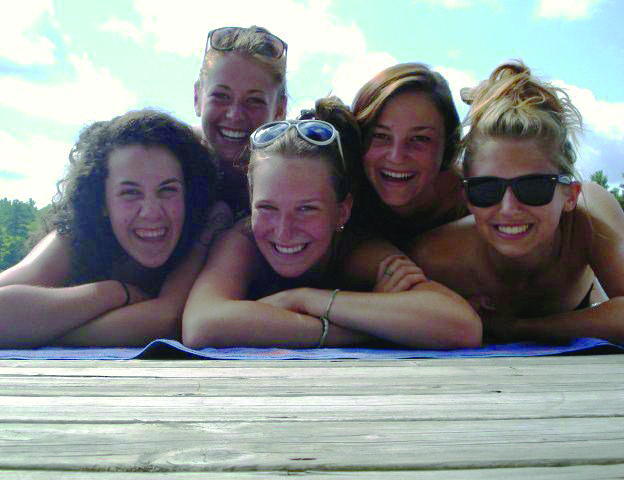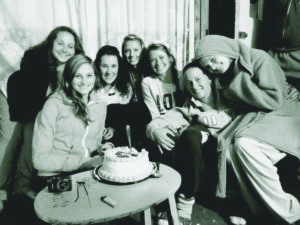A former camper reflects on life lessons learned as a residential camp counsellor
Emily Goshulak | Fulcrum Contributor
AS A CHILD, there was nothing more thrilling or mildly terrifying for me than leaving the comfort of my own home to go away to residential summer camp (also known as “sleepover” camp). Children thrive on the comfort of the routines and the familiar faces of home. The first experience of camp may seem exiting to most children, but that excitement is often accompanied by the fear of homesickness during their stay away from familiarity.
My first camp experience
I still clearly remember the sleepless night before my drive up to Camp Tawingo. So many questions raced through my mind. Will I miss my family? Will I miss sleeping in the comfort of my own bed? Will I make new friends easily? I was a bundle of nerves, yet I was also filled with excitement and anticipation as I stayed up all night with my siblings, discussing what awaited us when we arrived on our first day of camp.
To our amazement, the smiling faces and enthusiastic waves of staff members welcomed us within seconds of driving through the front gates of Camp Tawingo. It was in this moment that all feelings of anxiety dissipated. My counsellor greeted me with open arms that held me in a great big bear hug. It was a simple gesture that made me feel like I truly belonged there. Her kind spirit and contagious eagerness had a way of making me feel special, as if I was an essential member of our cabin.
To my surprise, this warm and comforting feeling wasn’t only present between me and my own counsellor; it was a way of being amongst all staff members at Camp Tawingo. I could be walking to the dining hall and a counsellor unknown to me would say hello or ask how my day was going, or I could lose my hat and a different counsellor would offer to help me look for it. The little things the counsellors did to help me went a long way in making me feel comfortable in my new environment. I took comfort in those moments and knew that I was a valued member of the Tawingo family.
Becoming A Counsellor
At the end of every summer at Camp Tawingo, I would count down the days until my arrival next year. I had made great friends—many of whom I am still friends with to this day—and had countless hilarious stories to share. After being a camper for six straight years, I was hooked.
When I turned 17 and was too old to return as a camper, I knew I wasn’t ready to say goodbye to Camp Tawingo. It had become my second home, where I felt like part of a family, and I knew it was largely due to the staff members’ passion for their jobs and strong love for their campers. I was grateful for my six years as a camper and it was my turn to give back by helping to create meaningful and unforgettable summer experiences for other campers.
Similar to the night before my first day as a Tawingo camper, I was a bundle of nerves before beginning staff orientation as a first-year counsellor. I had no experience planning activities or caring for children. Because of my inexperience, I was relieved to partake in the 10-day staff orientation prior to campers’ arrivals.
Skill development sessions during orientation strengthen counsellors’ creativity, leadership, and organizational skills. Because program planning is an essential aspect of Camp Tawingo, much emphasis is placed on teaching the counsellors how to create innovative and unique activities for their campers.
I worked alongside three other counsellors and the direct supervisor of my assigned age group throughout the summer. Although campers in all age groups participate in general programming set up by the directors, there is also time each day for cabin activities, which counsellors plan for all campers in their specific cabin. These activities are designed to help strengthen the relationships and promote a sense of belonging between the campers who bunk together.
We do it for the kids
The camp experience provides much more to campers than just a place to play. The Canadian Summer Camp Research Project, performed by professors and researchers at the University of Waterloo, documents the positive growth of campers in five categories: social integration and citizenship, environmental awareness, attitudes towards physical activity, emotional intelligence, and personal development and self-confidence.
In every single category, more than 50 per cent of campers surveyed demonstrated positive growth over the course of their time at camp. The highest rate of positive change in campers was 69 per cent for emotional intelligence—our ability to recognize and handle with our emotions and the emotions of others. The research also suggests that although positive growth occurs over one summer at camp, it happens more frequently and significantly in all categories over multiple summers.
According to research by Michael Ungar, a sociology professor at Dalhousie University, summer camp—be it residential or day camp—also largely aids in the development of resiliency in campers. Resiliency is one’s ability to bounce back from difficult issues that arise in everyday life. Though the environment of camp isn’t necessarily a problem campers need to deal with, it is a new environment that takes some getting used to, and forces kids to learn to adapt to uncomfortable situations.

Ungar stresses that resilience is a product of the way others help to develop our own. Summer camp is largely a social experience, since campers are almost always in contact with other kids, their counsellors, or camp directors. Counsellors—the main adult figures for campers during their stays at camp—have to ensure that kids are comfortable, but also challenged on social and physical levels on a case-by-case basis. Some kids in a cabin may be more accustomed to social interaction than others. It’s the counsellor’s job to ensure he or she adjusts the level of challenge during activities so that all children, no matter their level of resiliency, benefit psychologically by the end of their time at camp and leave with positive growth.
What I’ve learned
Creating separate plans of action for each individual camper throughout the summer gave me a level of patience I never had to develop before I became a counsellor. I had to assess each camper’s physical and emotional background and plan events to fit their many different skill levels. It was a difficult but rewarding task. Dealing with so many kids made me more patient with my friends and family members, and I noticed a great deal of change in my relationships with the people in my life.
Ungar’s concept of resiliency is something that I picked up quickly. As the summer progressed, I began to take initiative where I would have been too nervous to do so before. I really noticed a change in my initiative-taking abilities when I saw campers who needed a hand or who were sitting away from the group. I tried my best to find a common interest with these campers, no matter their age, and managed to make them feel included by spending time with them or introducing them to a group activity.
The necessity to accept circumstances as they presented themselves and persevere until a camper’s problem was solved has made me fight through issues in my daily life, no matter the size. I rarely get discouraged at school—even when the professor deems it acceptable to assign three 4,000-word papers in one semester—and when it comes to the overwhelming task of finding a new job, I find it easier to approach potential employers with confidence.
The pros and cons
Many past counsellors and staff members will admit that a major negative aspect of working at residential summer camps is the relatively tiny salary. Although room and board are covered, low wages are a frequent concern for university students with growing debt. The American Camp Association reports an average salary of only US$235 per week for residential camp counsellors and the Canadian average is not much different.
Another potentially daunting aspect of this job is spending the summer away from close friends and family and away from the world outside of camp. Though there are designated visitor days and break periods, the majority of my summer was spent in cottage country without access to television or the Internet. So many things happened that remained unknown to me for days on end; thinking back, I remember not hearing about Michael Jackson’s death until a week after it happened. For some people, living at camp could make them feel too isolated or disconnected. Personally, I revelled in my time off from the fast-paced world and treated camp like an extended vacation.
One of my overall highlights of Camp Tawingo was the bond I formed with other staff members. Living away from the city for two months can turn a big group of strangers into a tight-knit family. Everyone on staff looked out for one another. Whether we were checking on someone having a rough morning, stopping for a quick chat on our way to breakfast, or making late-night Tim Hortons runs on our time off, there was never any moment between the staff without smiles, laughter, and love.
Though many lessons came from leading a cabin of young girls, all of the people I met at camp as a counsellor have taught me so much about who I am and have helped form the person I am today in the crazy world outside Camp Tawingo.






